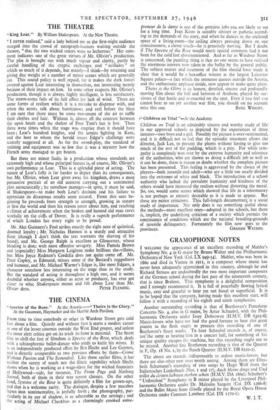THE CINEMA
" Spectre of the Rose." At the Astoria.—" Theirs is the Glory." At the Gaumont, Haymarket and the Marble Arch Pavilion.
FROM time to time somebody or other in Wardour Street gets cold feet about a film. Quietly and without fuss it starts a modest career at one of the lesser cinemas outside the West End proper, and unless the more alert critics get on its track its fame is minimal. The latest film to chill the feet of filmdom is Spectre of the Rose, which deals with a schizophrenic ballet-dancer who tends to knife his wives. It is an independently produced effort by Ben Hecht and Lee Garmes, and is directly comparable to two previous efforts by them—Crime Without Passion and The Scoundrel. Like these earlier films, it has neither the surety of touch nor the filmic capability which Hecht shows when he is working as a wage-slave for the wicked financiers of Hollywood—vide, for instance, The Front Page and Nothing Sacred, both of them in their way screen classics. On the other hand, Spectre of the Rose is quite definitely a film for grown-ups, and that is a welcome rarity. The dialogue, despite a few macabre lapses into sentimentality, is joyfully fresh ; the photography, par- ticularly in its use of shadow, is as admirable as the settings ; and the acting of Michael Checkhov as a charmingly crooked entre- preneur de la dance is one of the prettiest jobs you are likely to see for a long time. Ivan Kirov is suitably sinister or pathetic accord- ing to the demands of the story, and when he dances in the enclosed space of a living-room—the ceiling always pressing down on our consciousness, a clever touch—he is genuinely moving. But I doubt if The Spectre of the Rose would merit special comment had it not been for the cold feet aforementioned. And as far as Wardour Street is concerned, the puzzling thing is that no one seems to have realised the enormous interest now taken in the ballet by the general public. The subject matter and treatment of the film should have made it clear that it would be a box-office winner at the largest Leicester Square palace—a fact which the immense queues outside the Astoria, and the enthusiastic applause inside, now appear to make quite plain. Theirs is the Glory is an honest, detailed, sincere and profoundly moving film about the hell and heroism of Arnhem, played by sur- vivors of that battle and re-enacted on the spot. Even if you feel you cannot bear to see yet another war film, you should on no account


























 Previous page
Previous page